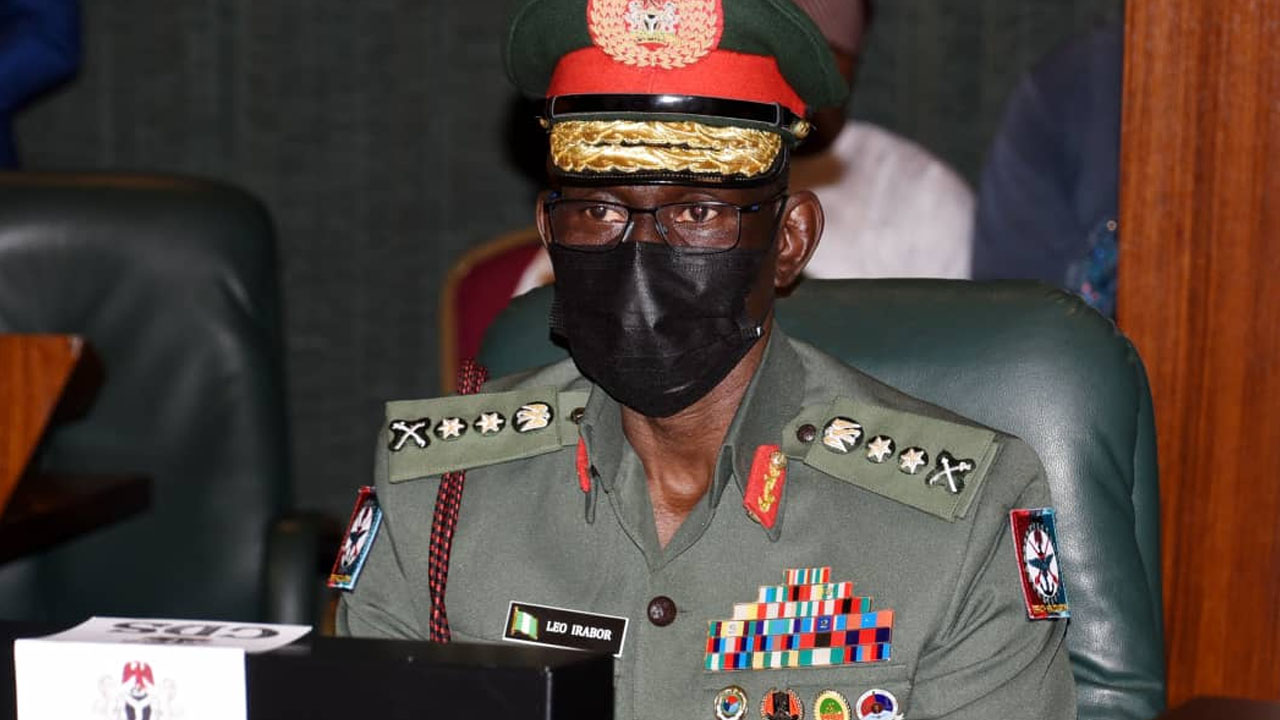80% of military personnel performing police duties in 36 states – CDS
The Chief of Defence Staff, Gen. Lucky Irabor, Wdnesday said 80 percent of the Nigerian Armed Forces personnel were deployed across the 36 states of the federation performing police duties. He spoke in Abuja Wednesday at the 21st Century Chronicle roundtable themed ‘Going for Broke: Fighting Insecurity in Nigeria’. Irabor, who spoke on the topic […]

The Chief of Defence Staff, Gen. Lucky Irabor, Wdnesday said 80 percent of the Nigerian Armed Forces personnel were deployed across the 36 states of the federation performing police duties.
He spoke in Abuja Wednesday at the 21st Century Chronicle roundtable themed ‘Going for Broke: Fighting Insecurity in Nigeria’.
Irabor, who spoke on the topic ‘Armed Forces and the War against Insecurity in Nigeria’, advocated more resources for defence and security to meet the yearning needs.
He said: “I know that almost all of us here believe that the military must be in every inch of our land and that is not possible.
“For us to be able to do that, not only do we need to increase in number, we also solidly to increase the capacity of the police and other security agencies to be able to play their policing roles such that the areas that the military has been able to liberate, or has brought some calmness, we should be able to leave the police and other security agencies to build upon.
“Of course, if we don’t have the support of the police to be able to build upon, we’ll be having issues. It’ll now become a cycle of where the military is involved in policing.
“As the Chief of Defence Staff, I’m looking forward to a day when all of us, soldiers, would come back to barracks and engage in core military duties – defending the territorial integrity of our nation.

“Today, close to 70 to 80% of our troops are on the field all year round, and I think we must begin to reshape it.
“I’m mentioning this not because we’re not working on it, but because we also need to understand that when there are calls for resource enhancement either for the understanding of the national assembly and the presidency, we’re going to put forward such demands.”
Irabor blamed the widespread insecurity in Nigeria on the Libyan crisis which led to free flow of arms.
According to him, no local government area in Nigeria is under the control of either members of ISWAP or Boko Haram terrorists.
The defence chief also identified Nigeria’s porous borders as a challenge in the fight against insecurity.
He also expressed concern that security issued had been politicized and ethnicized in the country.
Lamenting the reliance on imported military hardware, Irabor advocated focused-development of the Defence Industrial Corporation.
“What are the challenges? The first of it, as I mentioned earlier on, is the politicisation of security issues generally. Now, it needs to change to a different narrative so as to be eliminated. That’s why I have to crave indulgence of the media to join hands in ensuring that we publicize those issues. I’m concerned about the ethnicisation of security issues.
“We’ve absorbed a good number of the Civilian JTF. It’s an ongoing process. However, deploying them back where they come from does not fit in completely with our code of ethics. Otherwise, we’ll no longer be an Armed Forces, but the police. That kind of arrangement is best for the police.
“That’s the reason I join those advocating community policing. Yes, there’s a community policing framework currently, but it has to be escalated.
“The NPF is already working on this to see how they could boost community policing mechanisms beyond what it is right now,” he said.
He charged the judiciary to help the security agencies by delivering speedy judgments on all criminal cases, saying the judicial procedure of managing terrorism must be strengthened to serve as a deterrent for intending criminals, mostly terrorists, “who have resolved to be disturbing the peace of the country.”
A former Director, Defence Information, Major-Gen. Chris Olukolade (rtd), noted that it takes a lot of time to produce a soldier, airman or seaman.
He said Nigeria did not recruit soldiers when it should, during stability, but rather retired several soldiers due to paucity of funds.
In her remarks, Dr Mairo Mandara, said social justice should be considered to address insurgency which, she said, was caused by social injustice.
She disagreed to the CDS’ call for more resources for security and said advocated strategic use of available resources.
The chairman of the occasion, Senator Kashim Shettima said the economy must accommodate the teaming youths to tame insecurity.
He also stressed the need to regulate the social media, adding that the media deserves commendation, not condemnation.
